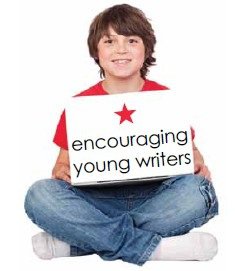 Is your son or daughter on the road to becoming the next Stephen King or J.K. Rowling?
Is your son or daughter on the road to becoming the next Stephen King or J.K. Rowling?
You can tell if your child has writing talent by looking for early traits of developing writers. They include a vivid imagination, good observation skills, contentment being alone (even if they like to play with others, too), an interest in words (vocabulary building, spelling, crossword puzzles, etc.), an interest in reading or hearing stories, making up their own stories (oral or written) and writing poems or stories without being asked.
Writing is a visual art, but instead of making pictures with crayons, water colors, acrylics or oils, writers paint pictures with words. They create “movies” in readers’ minds. Some children have talent for painting or drawing and writing. They may become future writer/illustrators and create beautiful picture books. Or, they may be content to write words and leave illustrations to others. Either way, you can encourage children who write to draw pictures for their stories. And encourage children who like to draw or paint to create stories to go with their artwork.
Many adult authors began writing as early as elementary school. And today’s kids as young as kindergarten are working on novels! So can yours. Here are some ways to encourage creativity and artistic development in young writers.
-
Make books and magazines available.
Good readers make good writers. Reading gives young authors a sense of storytelling, vocabulary and spelling and gives them a head start in creating their own stories. Make books available. Give books as holiday and birthday gifts. Go together to a library or bookstore. Magazines count, too. A subscription to a favorite children’s or sports magazine also encourages reading. -
Read together—and alone.
Very young children enjoy being read to, but so do older elementary students. For middle school and high school students, sit together each with your own book. And let your child see you reading even when it’s not a group activity. Occasionally, turn off the television and drop everything to read for 30 minutes. -
Discuss books.
Have you ever loved a book so much that you wanted to tell everyone you know about it? Tell your children! Talk about what you are reading and what you like or dislike about it. Ask what the youngster liked or disliked about a recently read book, poem or magazine article. Encourage some reading outside the child’s favorite genre. And include some nonfiction and poetry among the selections. Ask a librarian for recommendations on particular topics that interest your child. Teach your child how to find books they might like. -
Ask to read the child’s writing.
Showing interest your child’s writing shows that you think it’s important. Avoid the temptation to point out errors. Leave grammar and spelling to the schoolteacher. Instead, concentrate on what you like about the story and characters. Ask questions about why the writer chose specific character traits, setting and main scenes in the story. -
Write together.
Look for occasions to sit together and write. Perhaps write thank you notes for holiday gifts. Or write letters to relatives. For older children, encourage writing e-mails. (Texting is a form of writing, too. But with the weird abbreviations and spellings, it may not be as good for developing writing skills.) -
Keep copies of the child’s work.
Create a special folder to save copies of his or her poems and stories. This says, “Your work has value.” Post poems and stories on the refrigerator or family bulletin board. -
Help the child “publish” his or her work.
Printing and copy businesses can bind a novel or collection of poems or stories for a reasonable price. Make enough copies for the young author to give as gifts (or sell) to friends and family. Encourage submissions to youth writing contests and publications that take children’s work. Try these, and Google “written by children” for more:
www.Fun4Children.com
www.BlueZooWriters.wordpress.com
www.TeenVoices.com
www.CyberTeen.com -
Encourage older students to work on the school newspaper, literary magazine or yearbook.
Journalism and creative writing classes help develop writing talent, and kids enjoy the thrill of published work. -
Look for writing resources.
Search the Internet for websites of your children’s favorite authors. Many include tips and activities for young writers. Look for how-to and inspirational books about writing for young authors. Some good choices include Time for Kids: Ready, Set, Write!, by the editors of Time for Kids Magazine and R is for Rhyme by Judy Young. Older children may enjoy Writing Down the Bones by Natalie Goldberg, The Poetry Home Repair Manual by former national poet laureate Ted Kooser, and Bird by Bird by Anne Lamott. -
Buy the book.
When your young writer publishes his or her first book, be sure to buy one! Ask the author to sign it for you.
Mary-Lane Kamberg, Olathe, is the author of The I Love To Write Book: Ideas and Tips for Young Writers (Crickhollow Books, 2008).